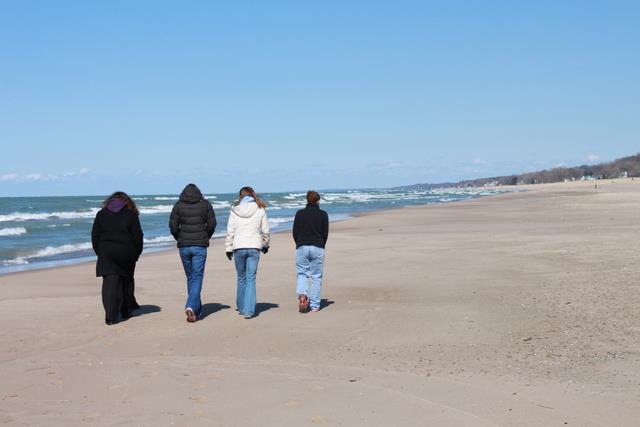I was given an unspeakable gift last weekend: the gift of sweatpant friends.
We women, we feel almost constant pressure to put forth our best self…to coordinate the outfit and gloss the lips and fix the hair and don the stylish (i.e., uncomfortable) shoes. All so we can look like we have it all together, that we ourselves are all together.
But last weekend eight of us girls who have been friends since the days of Jars of Clay and bad perms got together and spent a few days in the rarest of settings—a safe haven where we could be our unvarnished, un-makeup-ed, sweatpanted selves.
It’s been almost fifteen years since we were all in the same place together, and honestly I wasn’t sure how things would fall into place. Would it work to have eight women accustomed to having our own nests all together under the same roof? Would things get cliquey or competitive or catty? Would we still find common ground all these years later?
There were a thousand reasons not to do it—the cost, the travel arrangements, the logistics, the potential awkwardness. Not to mention the 14 collective children we have as a group, plus one on the way. Was it worth all the effort?
I credit our loyal, creative teacher-friend for setting the tone in the first place: You all don’t mind if I wear sweatpants all weekend, right?
And from that moment, the stage was set for things to be real, authentic, vulnerable. In a word: imperfect. Just like our cottage.
With its turquoise and canary-yellow walls, adorned with mismatched bits of Americana, the quirky rental felt like a metaphor in itself. The kitchen sloped down on one side; the wood floors let out contented groans every time we took a step. The gaps around the window frames and the door ushered howly gusts of wind and sand into the otherwise cozy living room.
But something about it felt just right. Community, after all, isn’t about creating something pristine, seamless, perfectly composed. The beauty of community comes when we bring together the mismatched pieces in a delightfully quirky collage. As the eight of us sat in our mismatched chairs, sipping hot chocolate and pouring out the past decade of our lives to one another, our words tumbled out much like our attire: real, raw, unpolished.
I know it’s unrealistic to live in beach-cottage world all the time, but still I wonder: How can I keep this sense of community even when my old friends are miles away? And how can I turn new friends and acquaintances into sweatpant friends?
I’m not quite sure, but I offer you the same challenge I pose to myself:
Reach out.
Take a risk.
Embrace the messiness of real friendship.
Find someone with whom you can ditch your makeup and your put-togetherness.
And by all means, if you don’t have a sweatpants-level friend, do whatever it takes to become one.
Friendship arises…when two or more of the companions discover that they have in common some insight or interest or even taste which the others do not share and which, till that moment, each believed to be his own unique treasure (or burden). The typical expression of opening Friendship would be something like, “What? You too? I thought I was the only one.” . . . It is when two such persons discover one another, when, whether with immense difficulties and semi-articulate fumblings or with what would seem to us amazing and elliptical speed, they share their vision—it is then that friendship is born. And instantly they stand together in an immense solitude.
—C. S. Lewis




